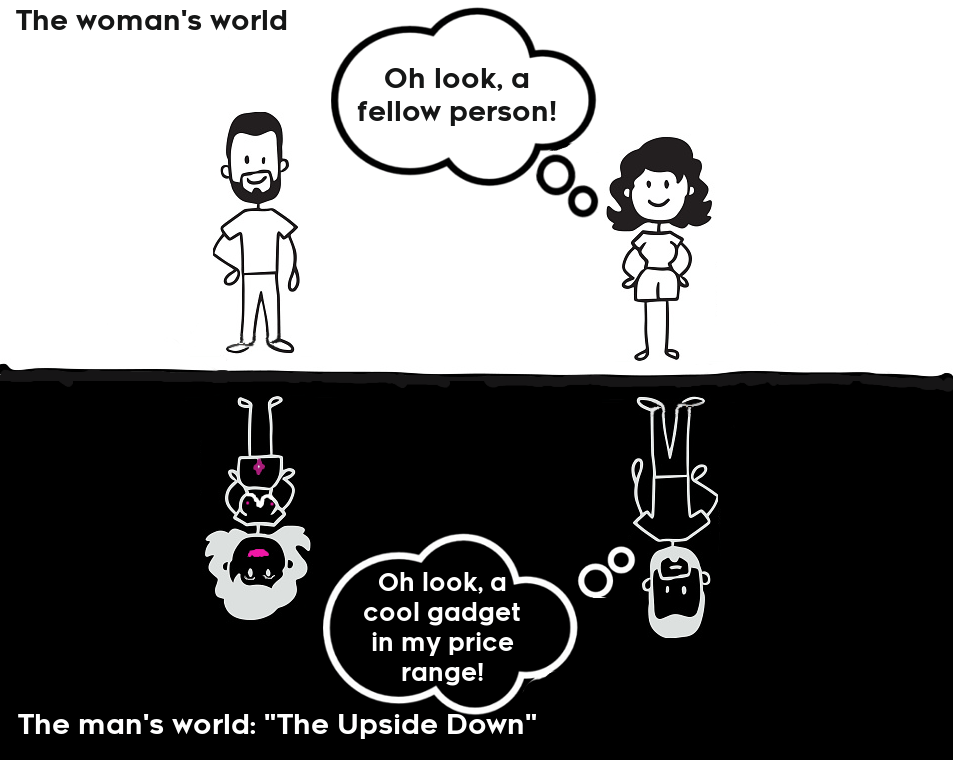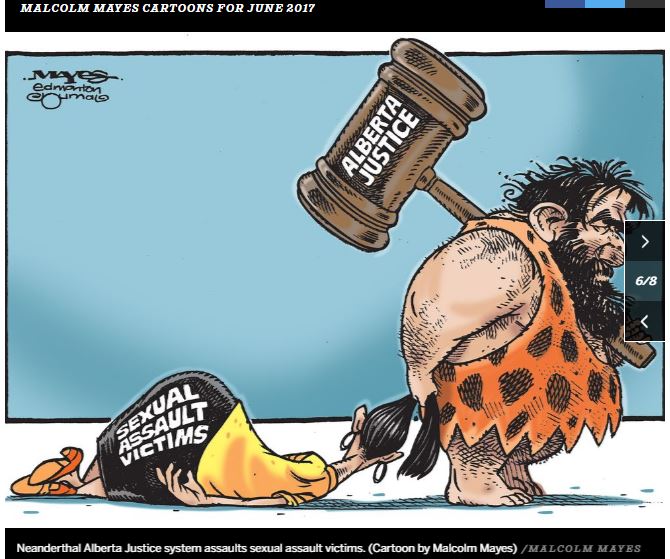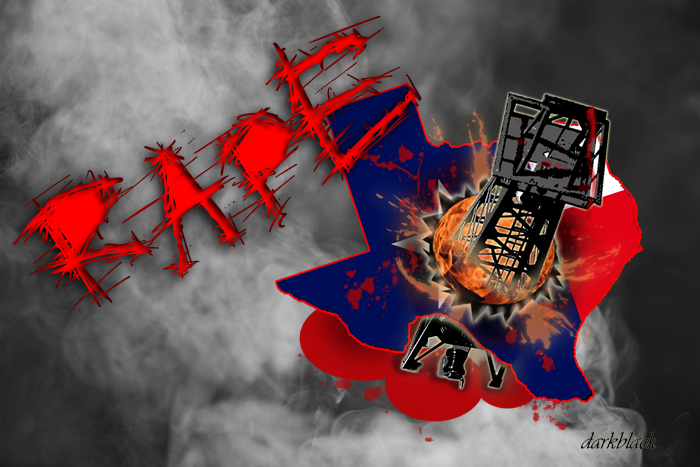The Upside Down of Patriarchy by Dana Vitalosova, Sep 21, 2016, medium.com
… And, how did patriarchy come into being? Lerner argues it started by the realization, that incest has weird consequences. To prevent close relatives having children, neighboring tribes began to exchange women of procreative age. Why were women, and not men, the objects of exchange, is still unclear.
… I don’t want to get into the whole history of women’s legal rights, so let me just mention a quite recent law showing the notion of women being de facto property was present in our legal systems not such a long time ago. Until the 70’s of the 20th century, in most “western” societies, if a husband raped his wife, it wasn’t considered a crime. The wife was HIS, afer all, am I right?
If you’re jubilant about the fact that we’re now living in different times, hold your donkeys for a moment.
Although our laws are now mostly egalitarian, the reality, unfortunately, still hasn’t quite catched up. We see it in the punishments, or lack of thereof for rapes, for domestic violence (it was HIS wife, right?), in sexist ads, in catcalling and in everyday conversations. …

“It’s the judges!” enabling rape and murder of women. No kidding. In Canada too.
Why do authorities, notably churches, pressure preach that we forgive our abusers, rapists and pedophiles? Forgiving rapists and pedophiles enables more rape and pedophilia.
Think before you forgive! It’s time we stop forgiving rapists, pedophiles and their enabling authorities notably Popes and other church officials, law societies, lawyers and judges.
2019 12 04: Report says Alberta women at high risk of being killed
*****
MUST READ! When judges don’t know the meaning of rape, there is little hope of justice, As we watch the Harvey Weinstein trial unfold, other horror stories emerge in our own courts by Sonia Sodha, Jan 25, 2020, The Guardian
Harvey Weinstein is at last facing justice in a New York courtroom. As I hear in graphic detail the accounts of the women he allegedly raped and sexually assaulted, it’s hard to stop myself imagining what I would do if a 21-stone man suddenly reappeared naked and lunged at me after manipulating me to accompany him to his hotel room on false pretences. Scream? Fight back? Try to escape?
It’s impossible to tell unless you find yourself there.
Our body’s response to acute danger is not rational: it releases a flood of hormones that trigger an automatic response over which the thinking part of our brain has little control. For decades, that response was understood as fight or flight. But that was a highly gendered understanding developed as a result of tests primarily done on men. (Women were considered too complicated as test subjects because of the hormone fluctuations associated with our menstrual cycles.)
Modern knowledge of neurobiological responses to trauma is far more nuanced. The fight-or-flight response is just one provoked by a complex cocktail of hormones our brain releases in extreme danger. There’s cortisol, for energy, but also natural opiates, which act to dull physical and emotional pain, corticosteroids, which reduce energy, and oxytocin, which increases positive feelings.
When a woman experiences sexual assault, she may fight or flee, but as a self-protection mechanism her body may also render her physically immobile – scientists refer to this as “tonic immobility” or “rape-induced paralysis” – and appear emotionless. It is the evolutionary equivalent to playing dead. Research suggests that up to 50% of survivors experience this during sexual assault. Additionally, the natural opiates inhibit survivors from encoding what happened into their memory, which makes it easy for legal defence teams to question their reliability as a witness.
The scores of women who say they have been assaulted by Weinstein describe this full range of response. Some tried to fight back, some escaped to the bathroom only to be faced with pounding at the door, others described how they “just lay there”, or “remember not having any fight” in them. All are common responses to sexual assault.
But the “freeze” response can be appallingly mischaracterised as willing submission and plays into societal myths about what does and does not constitute rape and consent. “Why didn’t she scream?” asked one of the defence barristers in a Belfast rape trial two years ago, as if that is the only legitimate response to rape. [we get a lot of that in Canada too]
***
And in Canada, we have super horrid judges that say IN COURT: “sex hurts & why didn’t you keep your knees together” AND OUR EX-CHIEF JUSTICE OF SUPERME COURT OF CANADA, Beverley McLachlin, SAID, IN ESSENCE, that women raped are to blame, ought to nicely and happily let their rapists have their way, must not complain, don’t dare be angry, and heaven forbid, don’t violate your rapist’s rights!
FURY RISING!
***
The legal definition of sexual consent is clear: it is given if someone “agrees by choice and has the freedom and capacity to make that choice”. Consent cannot be given when someone is scared or threatened, drunk, or asleep.
This definition is poorly understood by the public, particularly older generations. A third of people – 44% of over-65s – think it isn’t usually rape if a woman doesn’t consent to having sex, but there is no physical violence. A quarter of people – and one in three over-65s – think that sex without consent in long-term relationships is usually not rape. These attitudes undoubtedly filter into juries. Rape Crisis Scotland’s brilliant campaign, #ijustfroze, aims to educate people that a woman doesn’t need to physically resist for it to be rape.
But it’s not just some members of the public who do not understand what constitutes rape: neither do some senior judges. Last August, Robin Tolson, a male judge in his 60s, issued a family court judgment in a child custody case that suggested a woman had not been raped by her partner because she hadn’t physically fought back. She appealed, and her case was heard by high court judge Alison Russell.
Reading Russell’s judgment, published last Wednesday, requires a strong stomach. She is excoriating about her colleague, describing his approach to consent as “manifestly at odds with current jurisprudence”. She says: “The logical conclusion of this judge’s approach is it is both lawful and acceptable for a man to have sex with his partner regardless of their… willingness to participate.” Yes, you read that right: Tolson falls into the quarter of the population who think it’s OK for a man to rape his partner. Her judgment is filled with horrifying detail: Tolson did not let the woman testify behind a screen, allowed the man in question to solicit advice during his testimony, and implied, with no evidence whatsoever, that the woman was of a “neurotic disposition”. He dismissed sexually threatening texts – “If you don’t shut up I will stick my cock up your ass” – as sexting.
[I feel sick sick sick, supper is simmering on the stove, but I will not be able to eat it. No wonder largely male dominated companies pimp frac’ing everywhere, it’s another form of rape, and no wonder our male dominated regulators let companies illegally frac community drinking water supplies; inject their deadly toxic radioactive waste into protected drinking water aquifers; destroy homes, roads, communities with frac quakes; pollute our air, water, land, schools and bodies with secret toxic radioactive brews and endless evil Synergy Alberta and bribes; etc. etc. etc. And no wonder “judges” grant injunctions to abusive companies with which to “legally” harm rightful owners of land, pimping “rule of law.”]
The only reason this case is in the public domain is because the woman in question appealed to the high court. Family court proceedings are heard in private and subject to stringent reporting restrictions that limit parents’ ability to talk publicly about what happened. This is to safeguard children’s privacy, but the sheer weight of the shroud of secrecy that engulfs the family courts means attitudes such as Tolson’s can persevere without scrutiny.
This is why Louise Tickle, a journalist who has long reported on the family courts, is campaigning for more transparency.
Tickle points out that this isn’t the first time Tolson has been found by higher courts to have got it badly wrong on domestic abuse, and that he will have heard scores of similar cases whose judgments are not public. It’s impossible to know how far it goes. “I’m frequently contacted by women – and occasionally, men – who tell me family judges are presiding over appalling abuses of process when it comes to deciding what is and isn’t domestic abuse,” Tickle says.
Family court judges have an unenviable responsibility: they have to make balance-of-probability rulings about what happened between two parents behind closed doors, sometimes based on limited evidence, that determine how much, if at all, contact those parents have with their children, whose safety is paramount.
But Tolson has seen fit to use the lack of transparency in the family courts to – knowingly or unknowingly – perpetrate myths about legitimate responses to sexual assault and ignore the law on domestic abuse and sexual assault, issuing rulings that could put women and children at serious risk of harm. How can he ever be allowed to preside over a case again?
In our secret family courts, judges still don’t understand what rape means by Louise Tickle, Jan 5, 2020, The Guardian
When is rape, you know, real, proper rape?
Shockingly, in our family courts, it seems it’s only when you put up a fight and have the injuries to show for it. Never mind that you might clearly not consent to sex but in the end submit, terrified of what might happen if you were to actively resist.
In one recently reported case in the family courts a woman had complained to the court that she was a victim of domestic violence and had been raped.
Judge Robin Tolson ruled that because the woman had taken “no physical steps” to stop the man from raping her, “this did not constitute rape”, and consequently ruled against her. [Happens all too often in Canadian court rooms]
Legally speaking, this means that when it comes to that same judge deciding whether or not, say, it is safe for a father to have contact with his child, claims of sexual violence will not be taken into account.
Because, in the eyes of the court, that rape simply didn’t happen.
The fact that the family law system in this country is hidden behind a veil of secrecy means that these offensively vintage attitudes to rape and domestic violence can persist in courts that tens of thousands of separating couples must pass through every year.
And it raises the question: what other outrageously sexist decisions are being made by out-of-touch judges behind closed doors? [And, how outrageously abusive to environment, community and family, are the incessant regulator decisions enabling frac’ing?]
The woman in the above case was so horrified at the judge’s finding that she challenged it via appeal. Unlike in a normal family court hearing, appeals are heard in public, and findings can be openly reported.
It is only because of this tiny chink in the family justice system’s protective shield that we are able to glimpse inside Judge Tolson’s courtroom, and see such attitudes for what they are. The usual level of secrecy in the family courts stifles investigation and reporting of what goes on.
I am typically contacted several times a week by women who say family judges have not taken their evidence of domestic abuse seriously. These women, often mothers fearful of the man they say abused and sometimes raped them, are without question retraumatised by a system presided over by some judges who have simply not accepted a modern understanding of what is and is not domestic abuse or sexual assault.

You don’t need to be physically forced, there don’t need to be bruises, you don’t need to scream, for it to be rape
Women point particularly to difficulties in proving coercive control, a dangerous pattern of abusive behaviour that can indicate a risk of homicide.
Coercive control is now a criminal offence; but in family courts, I am repeatedly told, judges are reluctant to name it, even if they find that emotional and psychological abuse has occurred.
Not only that. Women say that judges can even agree domestic abuse has occurred but not consider it serious enough to protect the victim and child from what we now know to be its damaging continuing effects: an abusive ex can easily continue their controlling behaviour throughout many years of court-ordered contact with a child. [And regulators and our hideous politicians enable horridly abusive companies to frac/rape us and our loved ones, communities, farms and homes, again and again and again and again.]
If it were “just” scores of women telling me that this is happening, then these allegations would be exactly that: allegations. However, I recently sat through days of evidence in a family court case involving claims of domestic abuse and a dispute around child contact arrangements. The judge in that case made it clear he is unlikely to publish a judgment, and it is therefore unlikely at this stage that he will agree to allow the media to publish any part of what went on in court.
But I can say that I emerged from that courtroom astonished, dismayed and alarmed for very similar reasons to those that prompted the woman described above to appeal against a different judge’s findings about what constitutes rape.
In the year ending March 2019, more than 58,000 allegations of rape were made to police in England and Wales. It is an uncomfortable fact that many women are forced to have sex without their consent within relationships.
It may be inconvenient for a family law system that operates on the principle that children are better off having contact with both their parents to acknowledge this truth. But surely any judge who grasps the mechanisms and psychological effects of coercive control should understand that you don’t need to be physically forced, there don’t need to be bruises, and you don’t need to scream, in order for it to be rape.
This is 2020, not 1920. Society has moved on. So have the criminal courts, which are open to scrutiny and would be instantly challenged should any barrister or judge articulate such archaic attitudes.
Unless you have the courage and the cash to go to appeal, however, the family courts are essentially unaccountable to the public they serve.
Thanks to one of the most senior judges in the land coming firmly down on the side of the woman in the Judge Tolson case, she won her appeal.
But it may well feel like a hollow victory. She will now have to relive every aspect of her evidence of domestic abuse and sexual assault at a new fact-finding hearing. This will be in front of a different judge. [And who might be as dirty and ignorant as the first one, or perhaps worse.] But that court will, once again, sit in private. How can we – or she – know what attitudes to sexual violence lie in store for her there?
Family courts failing victims of abuse and rape, say experts calling for inquiry, Rick assessment is inadequate and ***victims are told to limit number of allegations,*** letter to MoJ states
Refer also to:
And our misogynistic judges get paid, and get too keep their huge pensions, no matter how many rapists they enable and or free.

Many more posts on this website detailing how horridly judges, lawyers and society treat victims of rape.
I am too angry to add more.
